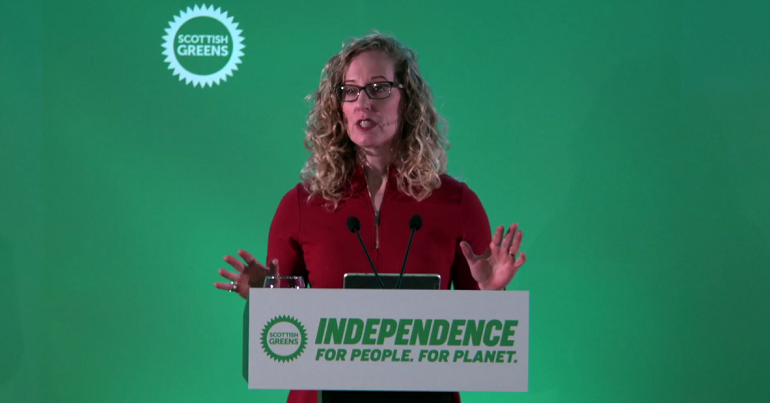Why socialists should join the Green Party #4: Greens support a major redistribution of wealth

Where should socialists put their energy in 2023? This is a question facing many on the left.
There are some obvious answers. The wave of industrial militancy that has swept across the country has necessitated a solidarity movement alongside it. Campaign groups like Enough is Enough have provided a space for people to begin organising for the economic transformations the country needs. With the climate crisis getting ever more urgent and a socialist solution to it ever more necessary – leftists have an important role to play within the climate movement.
These are all vital movements for the left to be organising within. But most socialists accept that while the collective struggle of social movements and of organised labour are crucial to building a new society, these movements also need a political expression. They need a political organisation able to fight elections, assume political office and – ultimately – wield state power. Since Keir Starmer’s ascension to the top of his party, it is abundantly clear that political expression will not and cannot come from Labour.
Instead, it must come from elsewhere. For a growing number of people – including more than a dozen left wing ex-Labour Councillors, Jeremy Corbyn’s former spokesperson, and outriders and influencers of the Corbyn era – that political expression of the tsunami of rebellion sweeping across the country, the political expression of socialism, will come through the Green Party.
In light of that, our editor Chris Jarvis is writing a weekly column setting out why disaffected socialists should join the Green Party.
Greens support a major redistribution of wealth
In a previous column, we’ve looked at how resisting privatisation is a key plank of any socialist project. But the transferring of assets from the public to the private sector isn’t the only scourge we’ve experienced since the onset of neoliberalism. Concurrent with it has been a major redistribution of wealth. That wealth has flowed upwards, with the richest in society amassing a greater share. Meanwhile, more and more people are facing severe economic insecurity, low pay and precarity.
The socialist response to this is clear. We need a fundamental redistribution of wealth from the top down.
The Green Party’s policy platform offers a vision for this redistribution. Starting at the bottom, the party is committed to delivering a £15 an hour minimum wage, a position which would single-handedly lift millions of low paid workers out of poverty.
Raising wages for those at the bottom, however, is insufficient to tackle inequality and redistribute wealth. That’s why the Greens also want to completely overhaul the current benefits system. Presently, the welfare system is degrading, punitive and ineffective. It doesn’t operate as a genuine social safety net. So, the Greens would abolish Universal Credit and work towards the introduction of a Universal Basic income – a non-means tested benefit paid to all that is designed to create a basic floor, below which no one in society is able to fall and to facilitate a greater degree of financial stability for all. Alongside this, the Green Party would replace the state pension and top-up benefits with a non-means tested citizen’s pension scheme which will be set above the poverty line.
Collectively, these measures would make a significant contribution to improving the standards of living for the poorest and most marginalised people in society. But a socialist project of redistribution not only requires providing more economic security for those at the bottom, it also must comprise the prevention of massive wealth accumulation at the top.
The Green Party would ramp up taxation on the richest to deliver this redistribution and properly finance public services. Closing tax loopholes which allow the rich to avoid their contribution to society is a key plank of the Greens’ economic platform. So too is reshaping the taxation system so that it better covers the means through which the rich acquire wealth – taxing income from investments and assets at the same level as income, and introducing a tax on wealth above a certain level. The Green Party would abolish the regressive council tax, replacing it with a land value tax. If they were implemented, the Greens’ policies would also see non-doms forced to pay tax and corporation tax increased.
A society with wealth redistributed in this way would look very different from that which we currently live in. It wouldn’t be rigged in favour of the mega-rich. It would allow everyone to maintain a decent standard of living. And it would be fundamentally less unequal.
Where are the Labour Party on all of this? Current shadow chancellor Rachel Reeves cut her teeth on Ed Miliband’s frontbench during which time she made headlines for saying Labour would be tougher than the Tories on benefits. Shadow work and pensions secretary Jon Ashworth has committed to maintain the punitive sanctions regime. In September 2021, Andy McDonald resigned from the frontbench after being instructed to argue against a £15 an hour minimum wage. The Labour Party have no plans to abolish the much despised Universal Credit.
On taxation, Labour have said that they would back increasing corporation tax. They’ve also repeatedly called for the closure of non-dom tax loopholes. However, despite pressure from MPs on the party’s left, Labour has made no commitment to introduce a wealth tax, not have they made any noise about reshaping the way local tax is levied.
Labour’s policy platform as it currently stands therefore offers no major movement on wealth redistribution. For most socialists, redistribution of wealth is foundational. You won’t get it from the red rosettes. The only mainstream party offering it is the Greens.
PS. We hope you enjoyed this article. Bright Green has got big plans for the future to publish many more articles like this. You can help make that happen. Please donate to Bright Green now donate to Bright Green now.
Image credit: Public Domain



It is great to see Green Party members out supporting those on strike. Equally our policies, in general, are to the left of Labour.
There is no doubt that there is a political space to the left of Labour. But I don’t think that space will be filled by a party focused on electoral politics like the Greens at the moment. Politics is so much more than winning elections. Power rests in the streets and the workplaces. If we are to be a socialist party that is where we should be building.
Labour will win the next election, possibly by a landslide. Once in office they will find themselves not in power at all. Starmer will be weak.If there is resistance it will come from streets and the workplaces, not by posing an electoral alternative. I am arguing therefore for a party to be socialist it will have to be revolutionary. Are we in GPEW ready for that?
Nothing in this about empowering people directly at work. Nothing about Worker’s Co-ops. It is party policy, all there in the Workers Rights part of the PfSS. However, nothing is ever said in favour of worker co-ops by the party leadership. More democracy at work is a fundamental requirement for any real change.
Thanks Martin – you might like these two previous articles in the series:
https://bright-green.org/2023/02/06/why-socialists-should-join-the-green-party-1-greens-want-to-end-the-privatisation-rip-off/
https://bright-green.org/2023/02/13/why-socialists-should-join-the-green-party-2-greens-support-the-great-strike-wave/
This is all getting a bit tediously anglo-centric.
Four articles in, and the E-word (for England) has not been used once, but every introduction talks about an unnamed ‘country’, three times.
There are three Green Parties in the UK state not one. When you constantly talk about “the” Green Party, it is the height of English-based arrogance to assume everyone reading knows what you are referring to.
And the SNP are the ‘mainstream’ left-of-centre dominant party in Scotland, not Labour, with 48 MPs elected to Westminster last election; while Sinn Fein are the largest ‘mainstream’ party in the British-occupied part of Ireland and have seven times the number of MPs at Westminster to “the” Green Party (of England); Plaid Cymru have four times the number of MPs. All of them claim or have sympathy with socialist values. Either state that you are only talking about politics in England, or don’t just choose the easy rivals, like Labour, to knock.
Works for me.